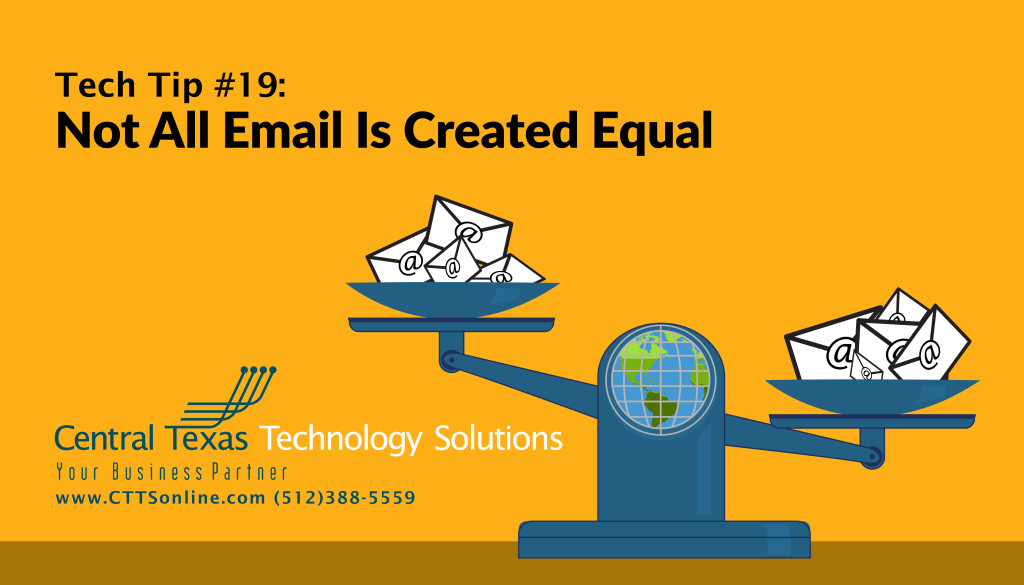 As an IT Managed Service Provider, we see technology solutions of all shapes and sizes. For email, there are several options out there and not all of them are created equal. So, I wanted to look at what is available and what may be best for business use.
As an IT Managed Service Provider, we see technology solutions of all shapes and sizes. For email, there are several options out there and not all of them are created equal. So, I wanted to look at what is available and what may be best for business use.
Internet email
This is basic email service that is usually offered by most Internet Service Providers when you sign up for service. It is usually uses what is called POP mail. POP stands for Post Office Protocol. The current version is called POP3. It allows an email program to download email from a server and keep it on the local computer. It is very simple and does not offer many features. It usually allows you to download the email and then deletes it off the server after a period of time (usually less than 30 days). This is the kind of email that most people use for personal email. Depending on the provider, you may have limitations on how much email can be stored on their servers. Some providers allow tiers of service and allow more storage for a higher price. Some providers will allow you to use your domain name with their service but others may not. While Internet email may be the cheapest option, it is the most basic of email services. It does not support any shared calendaring or contacts or any security. It is generally not suited for business use in any but the most basic requirements. Because the email is downloaded and removed from the server, it resides on the local computer and can be lost in the event of a hard drive or computer failure. The files that contain any local email should always be backed up, preferably to the Cloud.
Local Email Server
Some business prefer to keep their own email servers in their local networks. These could be Microsoft, Novell or some other flavor of mail server. This is much less common than in the past. With the proliferation of Cloud email services out there, it is usually cheaper and less overhead to have email from the Cloud rather than locally. In fact, in many ways, local email servers are a much bigger liability for a company not only from a cost perspective but also from a disaster recovery perspective than Cloud options. We strongly counsel our clients to migrate any local mail systems to the Cloud.
GMail
Google Mail and by extension Google Apps is a cloud based email service that can be used with a variety of email clients, like Microsoft Outlook and mobile apps. It offers integration into Google suite of productivity applications (if added to your account). GMail is a good business option if the use of Google Apps for Business is also desired. The integration is beneficial. However, if this is not the case, we generally recommend steering clear of GMail since Outlook is so ubiquitous and heavily used in the business world and Gmail has some challenges with it.
Office 365
Microsoft version of GMail. Depending on the plan, Office 365 can also have your Office software bundled into the service so you get Office and email. Since it is Microsoft, it offers full integration into Microsoft Outlook and supports all the features for it with regards to email, calendar and contacts.
Hosted Exchange
Hosted Exchange services use Microsoft’s Exchange server in their own Cloud data-centers. Like Office 365 they fully support all Outlook features. Hosted Exchange Providers also have other options like secure email, anti-spam and other services that may benefit companies dependent on their needs.
For the most part we recommend Office 365 or a Hosted Exchange Solution. All mail is stored on the servers and not downloaded which makes disaster recovery much better. The tight integration with Outlook makes it easy for shared calendar and contacts and makes delegate access very easy. The plethora of value added options for Hosted Exchange is beneficial for businesses that may have regulatory requirements and need things like secure email services. Most services are very reasonable in their cost per seat pricing and include mobile support as well. This means that Office 365 and Hosted Exchange services tend to give you the most bang for the buck.
So, that’s our basic look at email services for business. Hope this helps explain the landscape a little better and what options are out there. Spam protection and email services are essential in any business in Central Texas, and to get the right service that's suited to you, call CTTS today: (512) 388-5559
Happy emailing!

By Kurt Rinear
Director of Technical Services
Central Texas Technology Solutions
